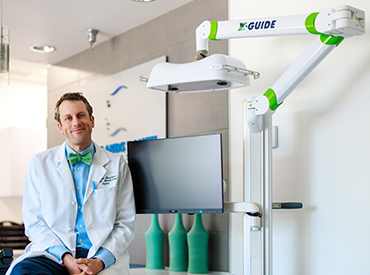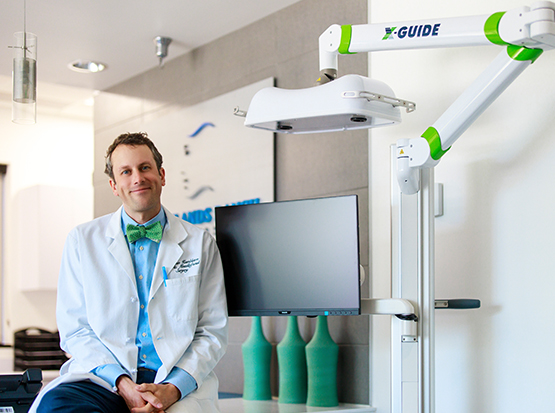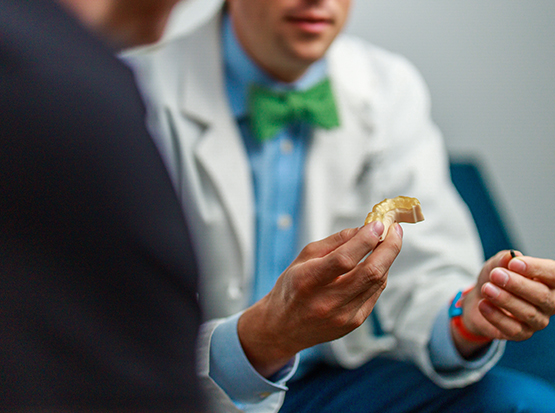 Your teeth are meant to last a lifetime, but infection, decay, trauma, and other factors can all lead to missing teeth. According to the American College of Prosthodontists, approximately 120 million Americans are missing at least one tooth.
Your teeth are meant to last a lifetime, but infection, decay, trauma, and other factors can all lead to missing teeth. According to the American College of Prosthodontists, approximately 120 million Americans are missing at least one tooth.
Years ago, dentures and bridges were the only solutions available. However, technology and treatment options have improved over the years, enabling you to restore your smile with natural-looking results using dental implants. This modern tooth replacement option is the ideal option to overcome the challenges caused by having missing teeth.
What Are Dental Implants?
Dental implants are small titanium posts that are inserted directly into the jaw to take the place of the tooth root. They are created from a biocompatible material that naturally fuses with your jawbone to hold a replacement tooth firmly in place. An abutment is then attached to the post in order to connect a crown to the implant. The new tooth blends in with existing teeth and is incredibly durable.
Now that you have an idea of what a dental implant is, it is time to decide whether it is the right treatment option for you.
8 Common Questions About Dental Implants
1. What are the requirements for having dental implants?
As technology has advanced, dental implants have become a more viable option for many patients. There are fewer limitations on who is and is not a good candidate. Here are a few of the factors that are taken into consideration:
- Your jawbone is fully developed
- You have one or more missing teeth
- You have adequate bone mass; this can often be achieved with a bone graft if bone loss is a concern
- Any gum disease has been treated
- You are a non-smoker or are willing to quit for the duration of the procedure and recovery
- Any chronic health conditions such as diabetes or high blood pressure are well-managed
Your doctor will complete a thorough evaluation to determine if you are a good candidate and to let you know if there are any concerns and how they can be addressed.
2. Are dental implants expensive?
There is not a set price for dental implants. It varies based on your individual situation and what is involved with surgery. A straightforward procedure to insert one dental implant will be less expensive than a more complex surgery involving multiple implants or procedures. Factors that can influence cost include:
- The number of implants being inserted
- The material used for the implant
- Where the implant is being placed in the mouth
- Whether any additional procedures such as tooth extraction or bone grafting are being performed
- Where the surgery is being performed (in-office surgical suite vs. an outpatient surgery center)
- Whether there are separate facility fees or anesthesiology fees
- Your geographic location
- The experience level of the surgeon
Once your doctor has assessed your needs and formed a general treatment plan, they can give you a more specific quote. Many practices offer financing or payment plans to make dental implants more affordable.
Keep in mind that the cost of a dental implant can be less in the long run as opposed to treating the complications that may occur from not replacing the tooth.
3. How safe are dental implants?
Dental implants have been used for decades, and they continue to improve. While any surgery comes with risk, dental implants are considered relatively safe. When properly placed and cared for, they have between a 95% and 98% success rate after five years. Many patients have their dental implants for years to come – potentially even for the rest of their lifetime.
Most dental implants are made of titanium, a biocompatible material that does not cause your body to react as though it is a foreign substance. Furthermore, titanium allergies are incredibly rare, and the material will not corrode. If you do happen to have a metal allergy, zirconia implants are a metal-free alternative that is also highly effective.
4. What are the benefits?
A major benefit of dental implants from an aesthetic perspective is that they enable you to regain a full, natural-looking smile by closing any gaps. You can smile with more confidence and not be concerned about hiding missing teeth. The crown that is attached to your dental implant will be custom-made to fit within the open space and blend in with adjacent teeth.
Another benefit of implants is that they keep your teeth from shifting out of place. When you have a gap, it gives your teeth room to move. They may become unevenly spaced or crooked, which can affect your bite. A dental implant keeps teeth in their proper place.
Dental implants also serve as artificial tooth roots. Without a root, there is no stimulation to the bone, and it can begin to deteriorate or resorb. By inserting an implant, it helps maintain the bone and structure of your jaw and face.
From a functional perspective, replacing missing teeth allows you to eat and speak more naturally. Your body does not have to adjust to accommodate any gaps.
5. Are there any drawbacks?
Compared to dentures or bridges, dental implants are not a quick solution. It takes several weeks for the implant to fuse and become stable enough to attach a permanent crown. A temporary crown can be used for aesthetic purposes, but it will not be fully functional. However, many patients find that the results are worth the wait. Once the dental implant is healed, it can be treated just like a natural tooth.
Dental implants have a high success rate, but there is always a slight chance of rejection. Your doctor will take precautions to prevent rejection, but it is still a possibility.
6. What happens if a missing tooth is not replaced?
The longer the tooth is missing, the more complications that can arise. Some common issues include:
- Difficulty eating certain foods depending on where the missing tooth is located
- Changes in speech
- Bone loss due to lack of stimulation from a tooth root
- Changes to your facial structure due to gaps and bone loss
- Altered bite because other teeth slowly shift out of place
- Self-consciousness about the appearance of missing teeth
7. What is the process for getting dental implants like?
There are several steps to getting dental implants, but your doctor will walk you through each one so that you know what will happen and what to expect.
Preparing for Dental Implants
Before any work begins, you will have a consultation with your doctor. They will perform a thorough examination of your teeth, gums, and jaw to determine whether you are a good candidate and to identify any concerns. They will also talk to you about what your goals are for your oral health and getting dental implants to make sure they are an appropriate option for you.
During the preparation phase, the doctor will take 3D scans of your mouth so they have a clear view of the structure of your mouth and can precisely position the dental implants. They will let you know whether tooth extraction or bone grafting is necessary prior to implant surgery or if they can occur at the same time.
Your doctor may also give you instructions, including what to wear, when you should stop eating if you are getting general anesthesia, when to arrive, and what plans to put in place for your recovery, such as someone driving you home or taking time off work.
Dental Implant Surgery
A common concern on the minds of many patients is whether dental implant surgery will hurt. Your doctor will administer a local anesthetic to numb the area ahead of time, so you do not feel any pain. If you are receiving general anesthesia, you will be fully sedated for the entire procedure, so you should not feel anything.
When it comes time for the actual surgery, here is a basic idea of what to expect:
- The doctor will administer anesthesia.
- An incision will be made in your gum to expose the bone.
- A small hole is drilled into the bone, and the dental implant is inserted.
- A few dissolvable sutures may be placed to close the gum tissue over the implant, or an abutment may be
- attached, so the implant sticks up slightly above the gum line.
- Gauze may be placed over the surgical site to help minimize any bleeding.
- Once the doctor gives the all-clear, you will be released to go home and begin recovering.
You may be able to have a temporary crown placed the same day, or you may need to wait several days. You will wear this temporary crown until the implant and bone are fused and stable enough to support your permanent crown.
Post-Operative Recovery
After surgery, your mouth will be a little sore, but many patients find that the discomfort is manageable. Over-the-counter pain relievers such as acetaminophen or ibuprofen are often enough to control any pain. During this time, your jaw may ache, similar to having a tooth extracted, and it is a good idea to take a day or two off of work until you are feeling better.
To help minimize any swelling or discomfort, apply an ice pack to your cheek and leave any gauze in place for at least 24 hours. As the anesthetic wears off, you will begin feeling more like yourself. Take it easy for a few days before jumping back into your normal activities.
For the first couple of days after surgery, you will want to stick to a liquid and soft food diet. That means eating things such as:
- Broth or smooth soups
- Smoothies/Milkshakes
- Mashed potatoes
- Yogurt
- Oatmeal
- Applesauce
- Pudding
By day three or four, you can incorporate other soft foods that are easy to chew, such as well-steamed vegetables, soft noodles, or scrambled eggs. You should avoid anything that is hard, crunchy, or difficult to chew. When drinking, do not use a straw as the force of the suction can disturb the implant and healing of the incision site. Try to chew on the side of your mouth where you did not have surgery.
Plan on taking it easy for the next week or two. Your doctor may allow you to resume light exercise, but nothing too strenuous. You will likely be feeling well enough to go back to work by day two or three after surgery. Be sure to follow up with your doctor if you have any questions or concerns.
Keep in mind that it takes about three months for the dental implant to heal and be securely anchored into your jawbone. During this time, you will want to be gentle with any temporary crowns or other prosthetics that have been placed until you get your permanent ones.
8. Will the replacement teeth look and feel natural?
Because dental implants are anchored to the bone, they are not removable like dentures or bridges, which means that you do not have to worry about them slipping out of place. Once the implant has fused and your permanent crown has been attached, it should blend in with existing teeth, and no one should be able to tell the difference. This new tooth will function just like a natural tooth, and you will be able to eat the foods you enjoy without limitations.
Achieve a Beautiful, Full Smile with Dental Implants
Dental implants allow you to get back to the foods and activities you enjoy without worry that someone might notice missing teeth. They are durable, long-lasting, and can enhance your overall oral health.
Schedule a consultation at Highlands Ranch Oral & Facial Surgery or at a practice near you to learn more about this tooth-replacement option.




